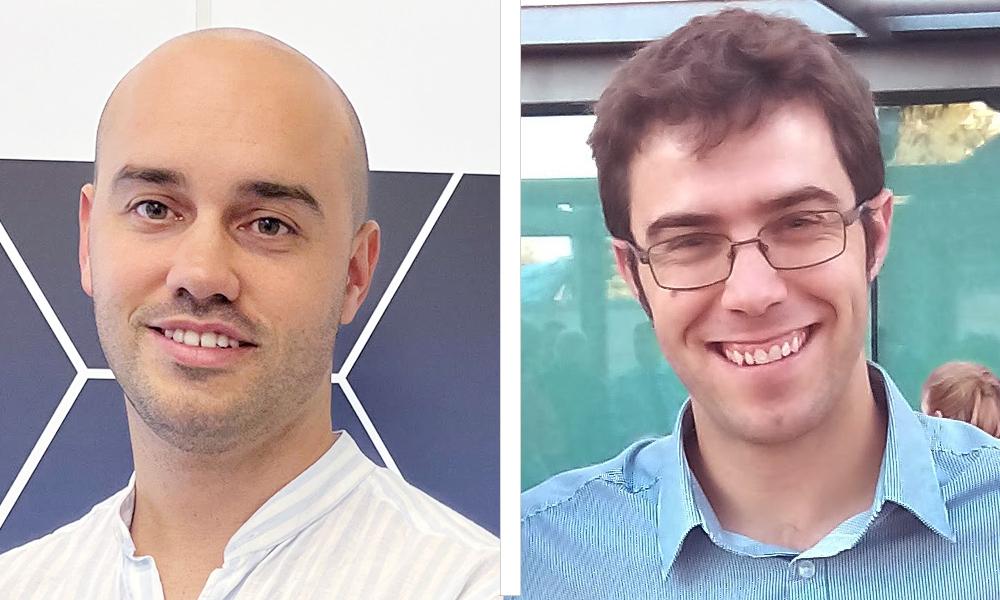Two UC3M researchers win a Leonardo 2024 Grant from the BBVA Foundation
For innovative projects in scientific research
7/24/24
Two professors from Universidad Carlos III de Madrid -Daniel García González and Pablo Martínez Olmos- have won a Leonardo 2024 Grant from the BBVA Foundation to support their research projects in the areas of engineering, computer science and data science.

In the image, Daniel García González (left) and Pablo Martínez Olmos, the two UC3M researchers who have won a Leonardo 2024 Grant.
The Leonardo 2024 Grants promote 58 innovative personal projects in ten areas of scientific research and cultural creation. It is a support program for researchers and creators between the ages of 30 and 45 who are at a decisive moment in their careers: an intermediate stage in which they will be able to develop and manage a personal project with the greatest flexibility. This call is open and highly competitive: 1,423 applications were submitted in 2024 and evaluated by 83 experts.
Engineering
In the area of engineering, Daniel García González, professor of Mechanics of Continuous Media and Theory of Structures at UC3M, has won a Leonardo 2024 Grant with his project: “Conceptualization of mechano-electrical sensors using hybrid magneto-rheological elastomers”. This project proposes the design of a new generation of soft mechanical sensors with binary electrical responses to kinematic thresholds, with the ability to adhere to biological tissues and to accommodate large cyclic deformations. For this purpose, a multi-material design framework will be created to allow the integration of autonomous repair responses (through magneto-mechanical interactions) with conductive electrical properties dependent on mechanical deformation.
The implementation of this type of technological applications will allow the conceptualization of soft biomechanical sensors. These solutions have great potential to improve the effectiveness of bioengineering solutions for cardiac or pulmonary pathologies. For example, the lack of ability of the heart to contract or relax properly is known as heart failure, which is often due to changes in the stiffness of the muscle and a weakness in its mechano-electrical response. The devices derived from the proposed project have great potential for integration with biomechanical actuators allowing bidirectional communication between functional biological responses and soft robotics systems. Furthermore, the proposed technology could be used as soft biomechanical sensors to measure kinematic parameters (e.g. joint rotations) during sports or daily activities (especially relevant during rehabilitation periods).
Computer science and data science
In the area of computer science and data science, Pablo Martínez Olmos, associate professor of Signal Theory and Communications at UC3M, has won a Leonardo 2024 Grant with his project: “THAI: Towards Humble And Discoverable AI”. This project addresses the concern about overconfidence and unreliability in generative Artificial Intelligence (AI). As AI technologies continue to reshape various industries, the project's main motivation lies in mitigating the risks associated with AI's persuasive capabilities, in particular the generation of plausible but unfounded results, known as hallucinations. THAI aims to develop generative AI methods that reduce overconfidence by reducing certainty without solid information.
This initiative is crucial to maintain the credibility of AI technologies and ensure user confidence by distinguishing between reliable and unreliable AI-generated content. In addition, the project aims to improve security by developing robust training methods that reduce the vulnerability of AI systems to attacks, which could take advantage of overconfidence to extract sensitive information or generate harmful content. Finally, the project aims to identify detectable traces in AI-generated content, making it easier to distinguish between real and synthetic results. These goals collectively contribute to the advancement of more discernible, reliable and ethically sound AI technologies, addressing foundational challenges of generative AI and paving the way for more responsible applications.